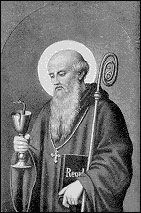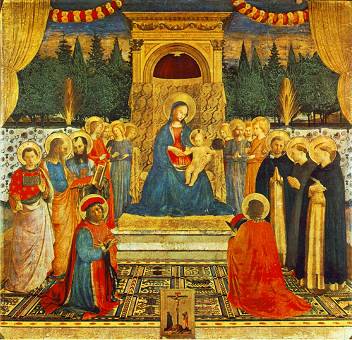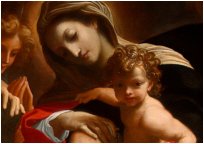
Home
Gregory XVII "Siri" The Pope in Red
The Coming Great Catholic Monarch
St. John Bosco's Dream (Vision) of Hell
Antichrist
(Catholic Prophecy)

The 1949 Edition
Translated by Rev. Boniface Verheyen, OSB
of St. Benedict's Abbey, Atchison, Kansas
| CHAPTER LXI : How Stranger Monks Are to Be Received |
But if during the time that he was a guest he was found to be troublesome and disorderly, he must not only not associate with the monastic body but should even be politely requested to leave, that others may not be infected by his evil life. But if he hath not been such as deserveth to be cast forth, he should not only be admitted to join the brotherhood, if he apply, but he should even be urged to remain, that others may be taught by his example, because we serve one Lord and fight under one King everywhere. If the Abbot recognize him to be such a one he may also place him in a somewhat higher rank.
The Abbot may, however, place not only a monk, but also those of the aforesaid grades of priests and clerics, in a higher place than that of their entry, if he seeth their lives to be such as to deserve it. But let the Abbot take care never to admit a monk of any other known monastery to residence, without the consent of his Abbot or commendatory letters, because it is written: "What thou wilt not have done to thyself, do not to another" (Tb 4:16).
| CHAPTER LXII : Of the Priests of the Monastery |
But let the one who hath been ordained be on his guard against arrogance and pride, and let him not attempt to do anything but what is commanded him by the Abbot, knowing that he is now all the more subject to the discipline of the Rule; and in consequence of the priesthood let him not forget the obedience and discipline of the Rule, but advance more and more in godliness.
Let him, however, always keep the place which he had when he entered the monastery, except when he is engaged in sacred functions, unless the choice of the community and the wish of the Abbot have promoted him in acknowledgment of the merit of his life. Let him know, however, that he must observe the Rule prescribed by the Deans and the Superiors.
If he should otherwise, let him be judged, not as a priest, but as a rebel; and if after frequent warnings he doth not amend, and his guilt is clearly shown, let him be cast forth from the monastery, provided his obstinacy is such that he will neither submit nor obey the Rule.
| CHAPTER LXIII : Of the Order in the Monastery |
And in no place whatever let age determine the order or be a disadvantage; because Samuel and Daniel when mere boys judged the priests (cf 1 Sam 3; Dan 13:44-62). Excepting those, therefore, whom, as we have said, the Abbot from higher motives hath advanced, or, for certain reasons, hath lowered, let all the rest take their place as they are converted: thus, for instance, let him who came into the monastery at the second hour of the day, know that he is younger than he who came at the first hour, whatever his age or dignity may be.
Children are to be kept under discipline at all times and by everyone. Therefore, let the younger honor their elders, and the older love the younger.
In naming each other let no one be allowed to address another by his simple name; but let the older style the younger brethren, brothers; let the younger, however, call their elders, fathers, by which is implied the reverence due to a father. But because the Abbot is believed to hold the place of Christ, let him be styled Lord and Abbot, not only by assumption on his part, but out of love and reverence for Christ. Let him think of this and so show himself, that he be worthy of such an honor. Wherever, then, the brethren meet each other, let the younger ask the blessing from the older; and when the older passeth by, let the younger rise and give him place to sit; and let the younger not presume to sit down with him unless his elder biddeth him to do so, that it may be done as it is written: "In honor preventing one another" (Rom 12:10).
Let children and boys take their places in the oratory and at table with all due discipline; outdoors, however, or wherever they may be, let them be under custody and discipline until they reach the age of understanding.
| CHAPTER LXIV : Of the Election of the Abbot |
But even if the whole community should by mutual consent elect a man who agreeth to connive at their evil ways (which God forbid) and these irregularities in some come to the knowledge of the Bishop to whose diocese the place belongeth, or to neighboring Abbots, or Christian people, let them not permit the intrigue of the wicked to succeed, but let them appoint a worthy steward over the house of God, knowing that they shall receive a bountiful reward for this action, if they do it with a pure intention and godly zeal; whereas, on the other hand, they commit a sin if they neglect it.
But when the Abbot hath been elected let him bear in mind how great a burden he hath taken upon himself, and to whom he must give an account of his stewardship (cf Lk 16:2); and let him be convinced that it becometh him better to serve than to rule. He must, therefore, be versed in the divine law, that he may know whence "to bring forth new things and old" (Mt 13:52). Let him be chaste, sober, and merciful, and let him always exalt "mercy above judgment" (Jas 2:13), that he also may obtain mercy.
Let him hate vice, but love the brethren. And even in his corrections, let him act with prudence and not go to extremes, lest, while he aimeth to remove the rust too thoroughly, the vessel be broken. Let him always keep his own frailty in mind, and remember that "the bruised reed must not be broken" (Is 42:3). In this we are not saying that he should allow evils to take root, but that he cut them off with prudence and charity, as he shall see it is best for each one, as we have already said; and let him aim to be loved rather than feared.
Let him not be fussy or over-anxious, exacting, or headstrong; let him not be jealous or suspicious, because he will never have rest. In all his commands, whether they refer to things spiritual or temporal, let him be cautious and considerate. Let him be discerning and temperate in the tasks which he enjoineth, recalling the discretion of holy Jacob who saith: "If I should cause my flocks to be overdriven, they would all die in one day" (Gen 33:13). Keeping in view these and other dictates of discretion, the mother of virtues, let him so temper everything that the strong may still have something to desire and the weak may not draw back. Above all, let him take heed that he keep this Rule in all its detail; that when he hath served well he may hear from the Lord what the good servant heard who gave his fellow-servants bread in season: "Amen, I say to you," He saith,"he shall set him over all his goods" (Mt 24:47).
| CHAPTER LXV : Of the Prior of the Monastery |
We foresee, therefore, that for the preservation of peace and charity it is best that the government of the monastery should depend on the will of the Abbot; and if it can be done, let the affairs of the monastery (as we have explained before) be attended to by deans, as the Abbot shall dispose; so that, the same office being shared by many, no one may become proud.
If, however, the place require it, or the brotherhood reasonably and with humility make the request, and the Abbot shall deem it advisable, let the Abbot himself appoint as Prior whomever, with the advice of God-fearing brethren, he shall select. But let the Prior reverently do what his Abbot hath enjoined on him, doing nothing against the will or the direction of the Abbot; for the higher he is placed above others, the more careful should he be to obey the precepts of the Rule.
If the Prior be found disorderly or blinded by vainglory, or hath been proved to be a contemner of the Holy Rule, let him be admonished up to the fourth time; if he doth not amend, let the correction of the regular discipline be applied to him. But if he doth not amend even then, let him be deposed from the office of priorship, and another who is worthy be appointed in his stead. But if even afterward he be not quiet and submissive in the brotherhood, let him also be expelled from the monastery. Still, let the Abbot reflect that he must give an account to God for all his judgments, lest perhaps envy or jealousy should sear his conscience.
Continue to the...
|
| Return to top of page |
| Bookmark this site |

© StGemma.com Web Productions Inc. 2005=2011. All rights reserved.